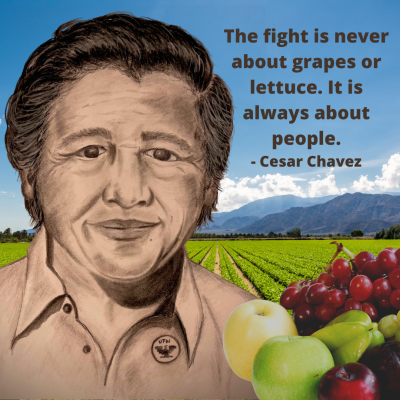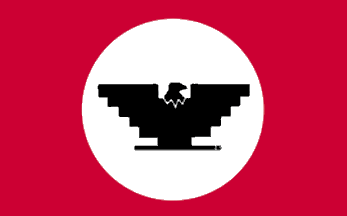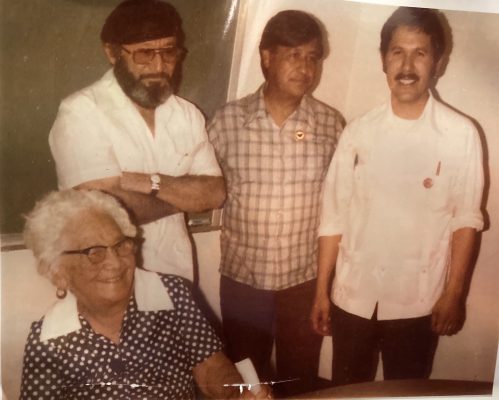Happy Birthday, Cesar Chavez!
“The fight is never about grapes or lettuce. It is always about people.”
—Cesar Chavez
“The love for justice that is in us is not only the best part of our being, but it is also the most true to our nature.” —Cesar Chavez
 Marisol Morales
Marisol Morales For Cesar Chavez, born in Arizona in 1927, this could not be closer to the truth. Throughout childhood and his time in the U.S. Navy, Chavez experienced intense discrimination, racism, and segregation, experiences which formed him into the civil rights and environmental activist and champion of universal equality and dignity we know him for today, a legacy of inner strength and courage.
“Cesar Chavez Day celebrates the legacy of union leader and labor organizer Cesar Chavez, who dedicated his life to improving treatment, pay, and working conditions for farmworkers,” writes the Chavez Foundation. “His legacy as the founder, along with Dolores Huerta, of the United Farm Workers of America, reminds us of the central place that organizing and collective bargaining holds in advancing the dignity and wellbeing of working Americans.”
Chavez became a migrant worker in 1942 shortly after finishing eighth grade so he could help provide for his family after his father was in an accident. Though he did not have a great childhood education, learning and books was Chavez’s passion. When he died, he was found with a smile on his face and a book on Native American art in his hand.
His reading, alongside influences like Father Donald McDonnell and Fred Ross, saw the start of Chavez’s activism. In 1962, alongside Dolores Huerta, Chavez founded the National Farm Workers Association (now known as the United Farm Workers, or UFW). Chavez chose the black and red colors for the organization’s flag, designed by his younger brother, Richard Chavez.

“A symbol is an important thing. That is why we chose an Aztec eagle. It gives pride… When people see it they know it means dignity.” —Cesar Chavez
The organization worked tirelessly to get grape growers to accept union contracts through methods such as the infamous Delano grape strike, including the 300-mile march from Delano to Sacramento, and his many fasts, a nonviolent method of protesting that followed Chavez through his life.
“A fast is first and foremost personal. It is a fast for the purification of my own body, mind, and soul. The fast is also a heartfelt prayer for purification and strengthening for all those who work beside me in the farmworker movement. The fast is also an act of penance for those in positions of moral authority and for all men and women activists who know what is right and just, who know that they could and should do more. The fast is finally a declaration of non-cooperation with supermarkets who promote and sell and profit from California table grapes.
During the past few years, I have been studying the plague of pesticides on our land and our food. The evil is far greater than even I had thought it to be, it threatens to choke out the life of our people and also the life system that supports us all. This solution to this deadly crisis will not be found in the arrogance of the powerful, but in solidarity with the weak and helpless.
I pray to God that this fast will be a preparation for a multitude of simple deeds for justice. Carried out by men and women whose hearts are focused on the suffering of the poor and who yearn, with us, for a better world. Together, all things are possible.” —Cesar Chavez on his 1988 36-day Fast for Life
 Courtesy of Marisol Morales
Courtesy of Marisol Morales It was from these movements that “La Causa” was born, a crusade to ensure better pay and safer working conditions and to recognize the dignity for all farmworkers. Chavez trained his union workers who picketed in cities in nonviolent activism techniques:
“Farmworkers everywhere are angry and worried that we cannot win without violence. We have proved it before through persistence, hard work, faith, and willingness to sacrifice. We can win and keep our own self-respect and build a great union that will secure the spirit of all people if we do it through a rededication and recommitment to the struggle for justice through nonviolence.” —Cesar Chavez
When he died in 1993 at age 66, Chavez was celebrated by over 50,000 mourners from across the country and all walks of life who came to hold vigil and march with Chavez one last time. The cardinal who presided over Chavez’s funeral mass called him “a special prophet for the worlds’ farm workers.”
The next year, Chavez’s widow accepted a post-humous Medal of Freedom from then-President Clinton:
“[He] faced formidable, often violent opposition with dignity and nonviolence, and he was victorious,” the President said. “Cesar Chavez left our world better than he found it, and his legacy inspires us still. He was for his own people a Moses figure. The farmworkers who labored in the fields and yearned for respect and self-sufficiency pinned their hopes on this remarkable man who, with faith and discipline, soft-spoken humility, and amazing inner strength, led a very courageous life.”
“Every day in California and in other states where farmworkers are organizing, Cesar Chavez lives in their hearts,” the new UFW President Arturo Rodriguez, Chavez’s successor, said in response to the President. “Cesar lives wherever Americans’ he inspired work nonviolently for social change.”
“Cesar, we have come to plant your heart like a seed… the farm workers shall harvest in the seed of your memory.” —Luis Valdez
Further resources on Cesar Chavez:
- The Story of Cesar Chavez by United Farm Workers
- About Cesar Chavez by Chavez Foundation
- A Flawed Hero: The Complex Legacy of César Chávez by Francisco Valladares and Alejandro Ramos
- Cesar Chavez – American Civil Rights Activist, a YouTube short by Biography
- Cesar Chavez’s Nuanced Views on Undocumented Workers & Immigration by United Farm Workers
- Cesar Chavez, the UFW, and Strategic Racism, an article by Duane Campbell, professor emeritus of bilingual multicultural education at California State University Sacramento and Director of the Mexican American Digital History Project.
- Cesar Chavez’s 1974 Letter to the Editor (San Francisco Examiner) on Amnesty and Legal Residency for Undocumented Workers
Additional and related resources:
- ¡Si Se Puede! Celebrating Dolores Huerta by EchoX Staff, a resource post about Dolores Huerta, labor rights activist and leader who launched the National Farm Workers Association (now United Farm Workers) alongside Chavez.
- Lessons Learned From My Beloved Father by Marisol Morales, an EchoX original piece about the generational impacts of family, culture, and justice.
This piece is part of EchoX’s new series where we acknowledge and celebrate the life, accomplishments, and impacts various community leaders had on their communities (and beyond). As part of this series, we are commissioning artists to create portraits to accompany these articles on our website and on social media.
If you are interested in signing up to be on our commissions’ list or if you have a suggestion of someone who should be in our Birthdays Series, please email voices@echox.org.
Our Northwest ethnic cultural communities have stories to tell and we need your support to amplify them! Donate $5 or $10 to help us continue raising the visibility of Northwest cultural community organizations and members. Follow us on social media or sign up for our mailing list to stay up to date on the latest in the Northwest.
